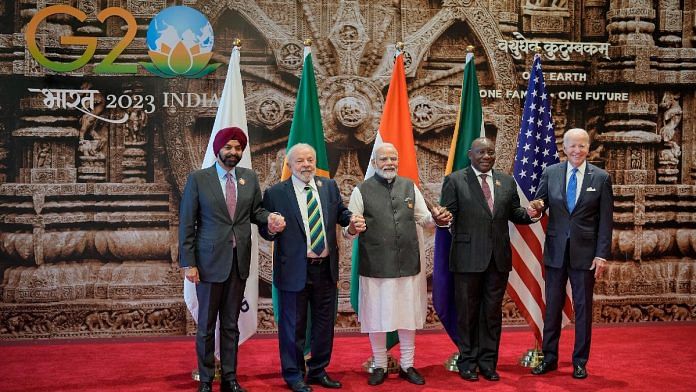New Delhi: Committing to strengthening the global health architecture, the New Delhi Declaration of G20 countries said Saturday that member states would focus on improving essential health services and systems to better than pre-pandemic levels, ideally within the next two to three years.
“We remain committed to strengthening the global health architecture, with the World Health Organization (WHO) at its core, and building more resilient, equitable, sustainable and inclusive health initiatives to achieve Universal Health Coverage, strengthening Global Health and implementing One Health Approach to enhance pandemic preparedness,” said the joint declaration by the G20 leaders.
For this, according to the declaration, there will be enhanced focus on strengthening primary healthcare and health workforce.
There will also be continued progress towards polio eradication and ending ongoing epidemics including AIDS, tuberculosis, malaria, hepatitis and water-borne and other communicable diseases, the declaration stated, also recognising the importance of research on long COVID.
The G20 leaders said they will work towards enhancing the resilience of health systems and support development of climate resilient and low-carbon health systems in collaboration with Multilateral Development Banks, and support the work of the WHO-led Alliance for Transformative Action on Climate and Health in (ATACH).
In the declaration, there is also a clause on prioritising tackling Antimicrobial Resistance (AMR) following the ‘One Health’ approach, including through research and development, infection prevention and control, as well as antimicrobial stewardship efforts within respective national action plans through AMR and antimicrobial consumption surveillance.
The declaration also said that the participants would work towards facilitating equitable access to safe, effective, quality-assured, and affordable vaccines, therapeutics, diagnostics, and other medical countermeasures, especially in low- and middle-income countries (LMICs), least developed countries and small island development states.
The leaders, according to the joint declaration, are also looking forward to a successful outcome of the ongoing negotiations at the Intergovernmental Negotiating Body (INB) for an ambitious, legally binding WHO convention, agreement or other international instruments on pandemic prevention, preparedness and response by May 2024, as well as amendments to better implement the International Health Regulations (2005).
The leaders also said that they recognise the potential role of evidence-based ‘Traditional and Complementary Medicine’ in health, and take note of international efforts in this direction, including WHO’s global and collaborating centres, and clinical trial registries.
They also pledged to support the WHO-led inclusive consultative process for the development of an interim medical countermeasures coordination mechanism, with effective participation of LMICs and other developing countries, considering a network of networks approach, leveraging local and regional R&D and manufacturing capacities, and strengthening last mile delivery.
Promoting and improving access to mental health services and psychosocial support in an inclusive manner was also part of the joint declaration.
(Edited by Gitanjali Das)
Also Read: Connecting India, Middle East & Europe — G20 marks launch of mega infra plan, seen as counter to BRI



